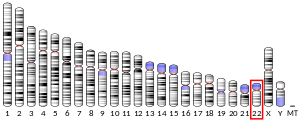DNA dC->dU-editing enzyme APOBEC-3H, also known as Apolipoprotein B mRNA-editing enzyme catalytic polypeptide-like 3H or APOBEC-related protein 10, is a protein that in humans is encoded by the APOBEC3H gene.[3]
Function
editThis gene encodes a member of the apolipoprotein B mRNA-editing enzyme catalytic polypeptide (APOBEC) family of proteins. The encoded protein is a cytidine deaminase that has antiretroviral activity by generating lethal hypermutations in viral genomes. Polymorphisms and alternative splicing in this gene influence its antiretroviral activity and are associated with increased resistance to human immunodeficiency virus type 1 infection in certain populations. There are only one to two members of this family of genes in nonprimate mammals but at least seven members in primates. APOBEC3H is an antiviral effector. In Old World, monkeys APOBEC3H has efficient antiviral activity against primate lentiviruses and it is sensitive to inactivation by the simian immunodeficiency virus Vif protein, and is capable of hypermutating retroviral genomes. The typical human APOBEC3H gene is inherently poorly expressed in primate cells and is ineffective at inhibiting retroviral replication.[4] Importantly, different people have different strengths and potencies of APOBEC3H. People with version of the gene for APOBEC3H which produce stable variations of the protein can successfully limit HIV-1's ability to replicate.[5]
References
edit- ^ a b c GRCh38: Ensembl release 89: ENSG00000100298 – Ensembl, May 2017
- ^ "Human PubMed Reference:". National Center for Biotechnology Information, U.S. National Library of Medicine.
- ^ "Entrez Gene: apolipoprotein B mRNA editing enzyme".
- ^ OhAinle M, Kerns JA, Malik HS, Emerman M (April 2006). "Adaptive evolution and antiviral activity of the conserved mammalian cytidine deaminase APOBEC3H". Journal of Virology. 80 (8): 3853–62. doi:10.1128/JVI.80.8.3853-3862.2006. PMC 1440450. PMID 16571802.
- ^ Refsland EW, Hultquist JF, Luengas EM, Ikeda T, Shaban NM, Law EK, et al. (November 2014). "Natural polymorphisms in human APOBEC3H and HIV-1 Vif combine in primary T lymphocytes to affect viral G-to-A mutation levels and infectivity". PLOS Genetics. 10 (11): e1004761. doi:10.1371/journal.pgen.1004761. PMC 4238949. PMID 25411794.
Further reading
edit- Dang Y, Siew LM, Wang X, Han Y, Lampen R, Zheng YH (April 2008). "Human cytidine deaminase APOBEC3H restricts HIV-1 replication". The Journal of Biological Chemistry. 283 (17): 11606–14. doi:10.1074/jbc.M707586200. PMC 2430661. PMID 18299330.
- Wang X, Abudu A, Son S, Dang Y, Venta PJ, Zheng YH (April 2011). "Analysis of human APOBEC3H haplotypes and anti-human immunodeficiency virus type 1 activity". Journal of Virology. 85 (7): 3142–52. doi:10.1128/JVI.02049-10. PMC 3067873. PMID 21270145.
- Wedekind JE, Dance GS, Sowden MP, Smith HC (April 2003). "Messenger RNA editing in mammals: new members of the APOBEC family seeking roles in the family business". Trends in Genetics. 19 (4): 207–16. doi:10.1016/S0168-9525(03)00054-4. PMID 12683974.
- OhAinle M, Kerns JA, Malik HS, Emerman M (April 2006). "Adaptive evolution and antiviral activity of the conserved mammalian cytidine deaminase APOBEC3H". Journal of Virology. 80 (8): 3853–62. doi:10.1128/JVI.80.8.3853-3862.2006. PMC 1440450. PMID 16571802.
- Vartanian JP, Guétard D, Henry M, Wain-Hobson S (April 2008). "Evidence for editing of human papillomavirus DNA by APOBEC3 in benign and precancerous lesions". Science. 320 (5873): 230–3. Bibcode:2008Sci...320..230V. doi:10.1126/science.1153201. PMID 18403710. S2CID 23886176.
- Ooms M, Majdak S, Seibert CW, Harari A, Simon V (August 2010). "The localization of APOBEC3H variants in HIV-1 virions determines their antiviral activity". Journal of Virology. 84 (16): 7961–9. doi:10.1128/JVI.00754-10. PMC 2916534. PMID 20519396.
- Tan L, Sarkis PT, Wang T, Tian C, Yu XF (January 2009). "Sole copy of Z2-type human cytidine deaminase APOBEC3H has inhibitory activity against retrotransposons and HIV-1". FASEB Journal. 23 (1): 279–87. doi:10.1096/fj.07-088781. PMC 2626612. PMID 18827027.
- Collins JE, Wright CL, Edwards CA, Davis MP, Grinham JA, Cole CG, et al. (2004). "A genome annotation-driven approach to cloning the human ORFeome". Genome Biology. 5 (10): R84. doi:10.1186/gb-2004-5-10-r84. PMC 545604. PMID 15461802.
- Strausberg RL, Feingold EA, Grouse LH, Derge JG, Klausner RD, Collins FS, et al. (December 2002). "Generation and initial analysis of more than 15,000 full-length human and mouse cDNA sequences". Proceedings of the National Academy of Sciences of the United States of America. 99 (26): 16899–903. Bibcode:2002PNAS...9916899M. doi:10.1073/pnas.242603899. PMC 139241. PMID 12477932.
- Harari A, Ooms M, Mulder LC, Simon V (January 2009). "Polymorphisms and splice variants influence the antiretroviral activity of human APOBEC3H". Journal of Virology. 83 (1): 295–303. doi:10.1128/JVI.01665-08. PMC 2612324. PMID 18945781.
- Zhen A, Wang T, Zhao K, Xiong Y, Yu XF (February 2010). "A single amino acid difference in human APOBEC3H variants determines HIV-1 Vif sensitivity". Journal of Virology. 84 (4): 1902–11. doi:10.1128/JVI.01509-09. PMC 2812409. PMID 19939923.
- OhAinle M, Kerns JA, Li MM, Malik HS, Emerman M (September 2008). "Antiretroelement activity of APOBEC3H was lost twice in recent human evolution". Cell Host & Microbe. 4 (3): 249–59. doi:10.1016/j.chom.2008.07.005. PMC 2608726. PMID 18779051.
- Köck J, Blum HE (May 2008). "Hypermutation of hepatitis B virus genomes by APOBEC3G, APOBEC3C and APOBEC3H". The Journal of General Virology. 89 (Pt 5): 1184–1191. doi:10.1099/vir.0.83507-0. PMID 18420796.
- Li MM, Wu LI, Emerman M (January 2010). "The range of human APOBEC3H sensitivity to lentiviral Vif proteins". Journal of Virology. 84 (1): 88–95. doi:10.1128/JVI.01344-09. PMC 2798431. PMID 19828612.
External links
edit- Human APOBEC3H genome location and APOBEC3H gene details page in the UCSC Genome Browser.

